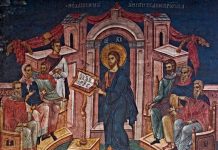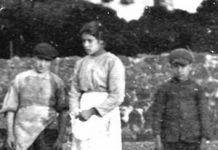A joyous Independence Day to all our American readers, one that may be more muted than days of yore in the troubled United States. There are any number of factions developing in the once-United States, but all can be traced back to those who accept the Christian, or at least rational principles underlying the republic, from those who have rejected them. This may have been predicted, for can a nation ever truly persist without being undergirded by the fullness of truth that Christ offers in the Catholic Church? Did the over-exaltation of ‘independence’ descend into individualism, sowing the seeds, however, subtly, for what we are now witnessing? Many of those who hold to ‘self-evident’ truth of the Constitution sent their children, at great expense, to universities and colleges where they were brainwashed that those truths are not self-evident, and that the only ‘truth’ is an insidious doctrine of nihilism, will-to-power, anarchy and destruction, a moral morass that leads only to one tragic place, unless one repents.
We can only be independent if we are free, and only free if we live in the truth which ‘sets us free’. The Didache, the early teaching of the Apostles, following that exhortation of Moses to the Israelite people, proclaims that there is a way of life, and a way of death, and a great divide exists between the two, as we are tragically discovering. Here’s hoping and praying the way of life wins out in the hearts of many, as they witness the nihilistic and destructive force of the way of death. The United States is not so united anymore –
For a bit of an uplift, as you are washing dishes or preparing a meal, is Mark Steyn’s audio celebration of a happier and more triumphant time in America – which is not that long ago, and what was, might yet be again.
On that note, we also honour on this day Elizabeth of Portugal (+1336), who lived in her own brutal time at the dawn of the fourteenth century, queen, wife, mother, widow, peacemaker, third order Franciscan who, after her fractious husband’s death (whom she sanctified, as much as his coarser soul could take, it seems), retired in 1325 to an hidden life of prayer and penitence in a convent which she had founded eleven years prior, feeding the poor and tending the sick. She twice placed herself physically between her warring family, specifically, her husband’s forces against those of his sons, and the second time was too much strain, bringing on a moribund fever. Elizabeth was immediately hailed as a saint, and canonized by Pope Urban VIII in 1625, the same Pontiff who would condemn Galileo seven or so years later, but who also sent the Jesuit missionaries to New France, later named, of course, Canada – eight of them future martyrs, including Jean de Brebeuf, as well as Antoine Daniel, who was put to death on this day. People are complicated, including Popes.










